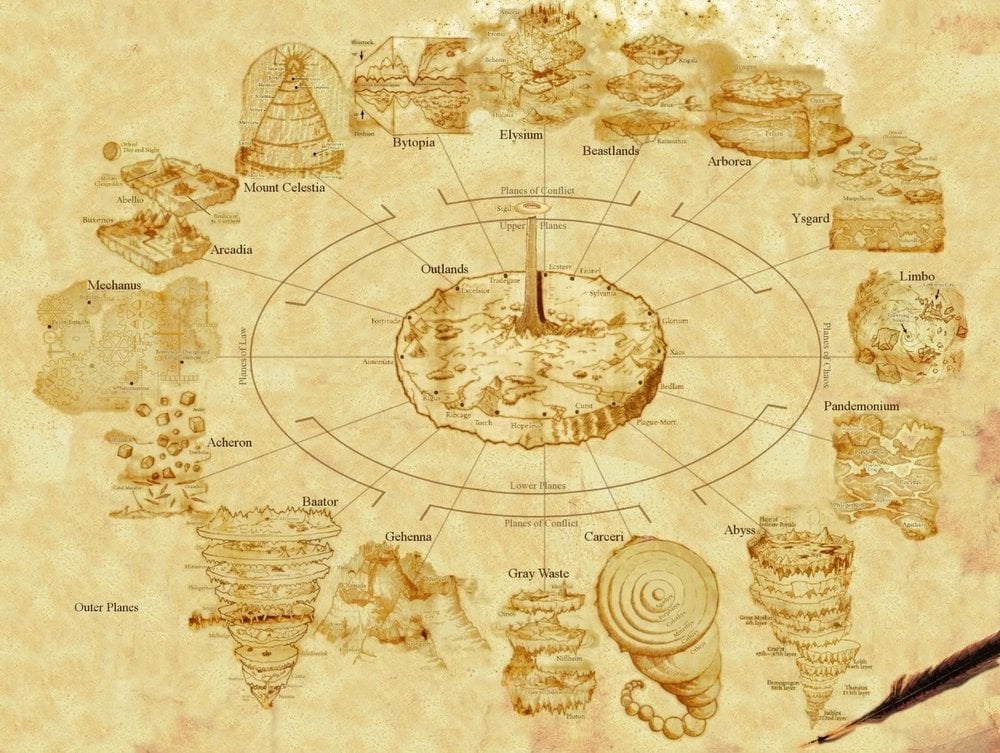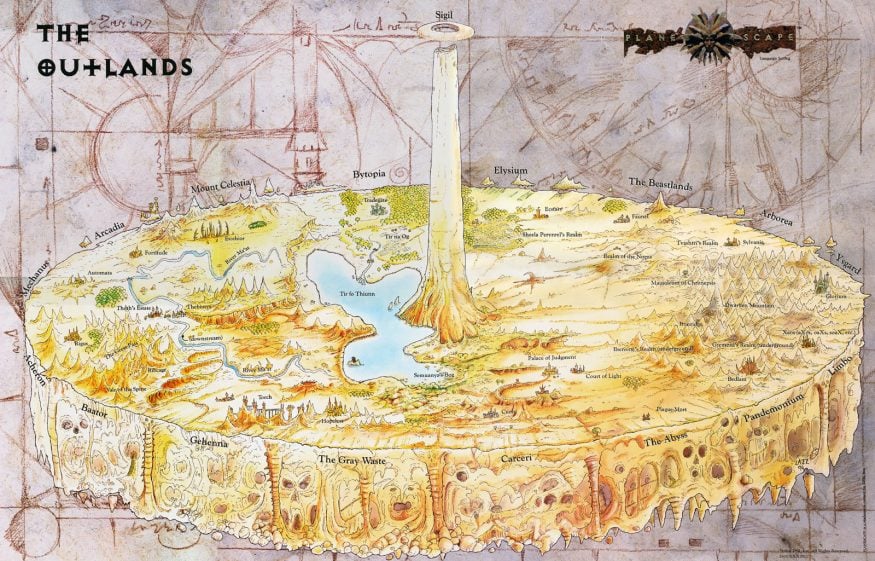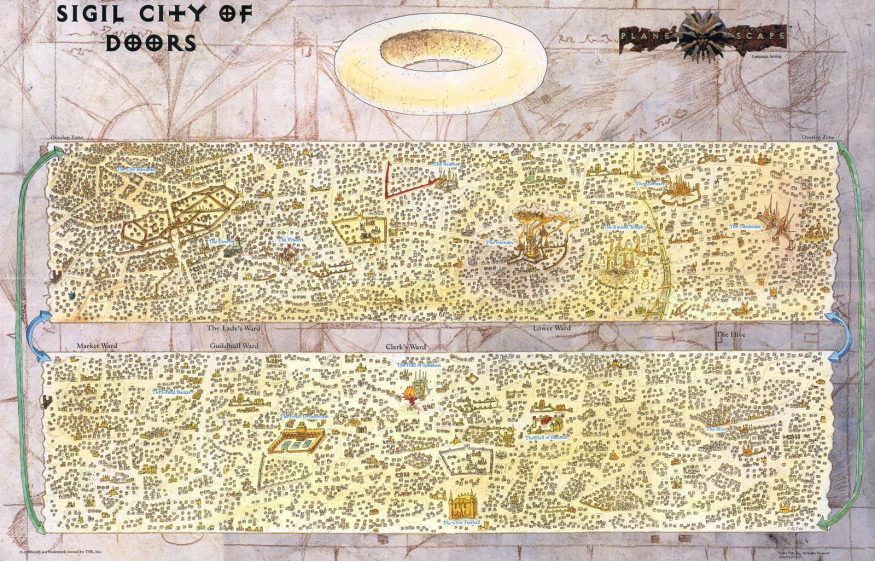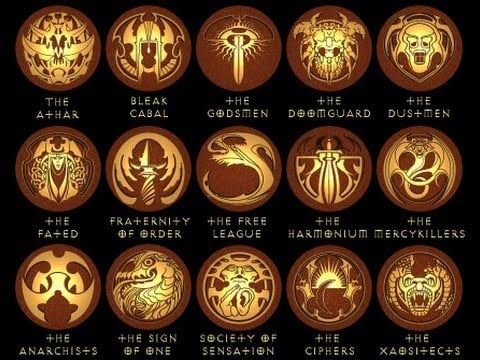D&D: An Adventurer’s Guide To Sigil – City of Doors
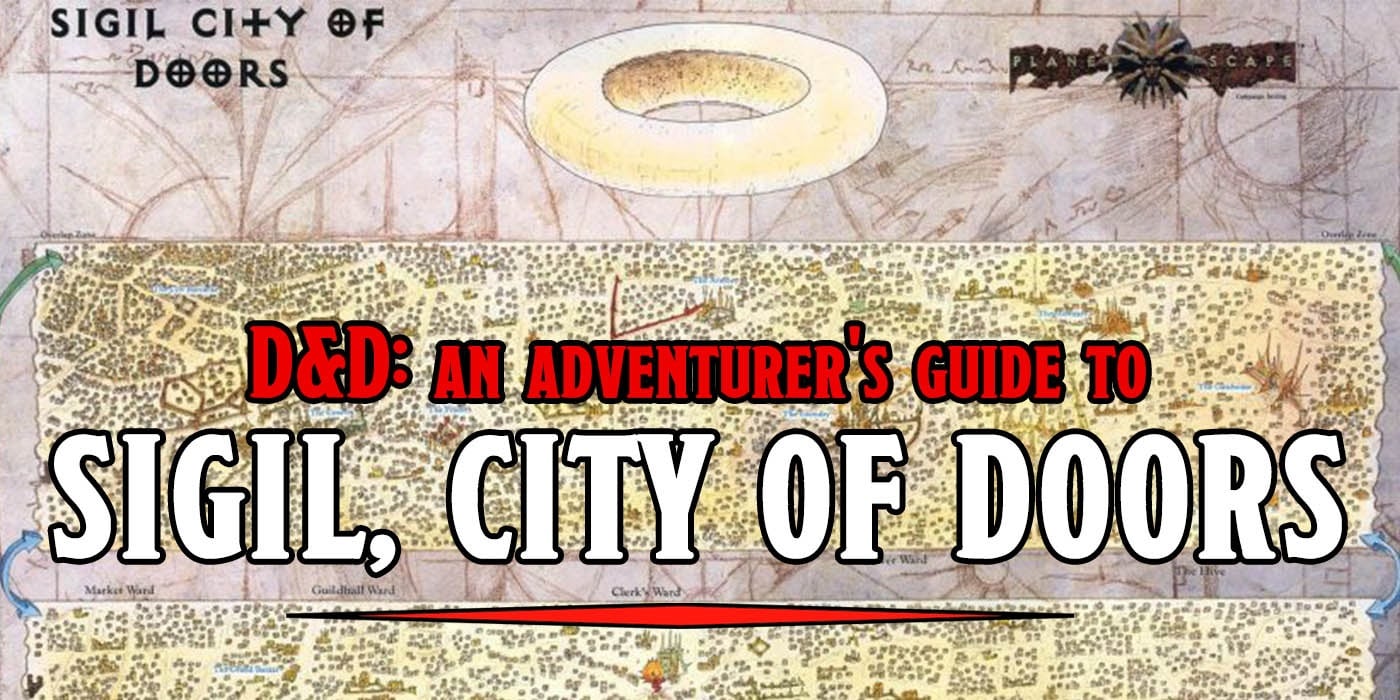

Planescape is back next year. And with it, we shall again visit the crown jewel of the cosmos: Sigil, the City of Doors.
The multiverse of D&D is vast. It contains worlds enough for even a Magic: the Gathering fiction writer. The recent Spelljammer: Adventures in Space gives just a taste of that expansiveness with a map showing where Faerun, Greyhawk, and Krynn are. And yet, there’s so much more. You might visit the apocalyptic wasteland of Athas. Or the immortal bloodlines of Aebynris. Whatever your preference, there are many different worlds—almost as wide varieties of worlds as there are varieties of elves.
But at the heart of it all is a world like no other. In fact, it’s a single city, the enclosed city that floats at the center point of the cosmos: Sigil, City of Doors.
Sigil, City of Doors – Cosmic-politan
Sigil sits at the spire at the heart of a Great Wheel. From it, you can reach anywhere in the multiverse… as long as you can get out, which is a great deal harder than you might imagine.
Come to the torus that contains a whole city. A city that samples pretty much everything from the multiverse. You’ll find celestials and fiends; you’ll discover bewildered humans and denizens from worlds long forgotten. The only thing you won’t find, though, are gods.
No Gods, Only Wards
And if you’re not careful, you won’t find much of anything else because the city might seem confusing at first glance. But do not despair, for it actually makes its own twisted kind of sense. The city is divided up into six different wards:
- The Lady’s Ward — where the essential things are: courts, prison, etc. All the tools the Lady needs to run her city, even if she doesn’t live here, all the rich people do.
- The Lower Ward — the industrial portion of the city, often full of thick, choking smoke from various furnaces, and let’s hope that’s all.
- The Market Ward — pretty much what it says on the tin. If you wanna buy something, anything, you can find it here.
- The Guildhall Ward — or get it made here. After all, artisans gotta have a place too.
- The Clerk’s Ward — this is where you go to get your shirt stuffed with red tape. All the bureaucrats and other city officials who can’t afford luxury live here.
- The Hive — the place where most unfortunates end up. You’ll be right at home here if you’ve ever been a dreg of society.
Each of these wards could be a nation unto itself–and indeed, the city might have fallen that way if not for the Factions—groups of people working to keep the trains running, so to speak. For while the Lady of Pain is the absolute ruler of Sigil, she doesn’t much care about it unless you’re doing something to threaten it. The ebb and flow of commerce and the city’s well-being fall into the hands of the fifteen factions (there are fifteen because the Lady decreed there should be fifteen) that scrabble for whatever power or authority they can muster. Here are the factions in Sigil, City of Doors.
Athar
First up, you have the Athar, also called the defiers or the lost. The Athar are fed up with the gods–they have seen their pettiness and wars and become disillusioned by how they run things. They’ve seen the Planes and come to believe that the powers (as they call them) are just denizens of another plane, and that doesn’t make them worthy of worship. But for all that, true divinity is something important to the Athar. Like Mulder, they believe the truth is out there, but no one has found it yet. Perhaps it lies concealed behind the veil of the world, which they sometimes call the Great Unknown–and is the source of their powers.
Believers in the Source
Next up are the Godsmen. They believe life is just a crucible in which souls are forged into something more significant. Ascension is the path they would tread–after all, for them, anyone can eventually become a god. And that ultimately, even the gods evolve or transcend their nature and become something else. For the godsmen, whose base of operations is at the great foundry of Sigil, City of Doors, the world is constantly forging and reforging itself (and its people) with a sublime apotheosis as its ultimate goal. Something they would try and achieve–even if it means hastening the end of everything to get to it.
Bleak Cabal
Existentialists and nihilists to the core, Bleakers believe that the world has no divinity or higher meaning to it. That the physical is all, there is (which gives them a bleak or insane outlook on life). They don’t look for meaning on the outside of life–instead, seeking to find it through their own actions.
Doomguard
Echoing the doom and gloom aspects of the Bleakers, the Doomguard believe that entropy and the destruction of everything are inevitable. They don’t see this as something to fear but rather see it as something beautiful. When the planes decay and are gone, they will take with them imperfection, and something perfect will take its place—they do not guard against doom, but rather guard doom against those who would try and stave it off. Most people in Sigil, City of Doors, give them a wide berth up until they can’t.
Dustmen
The Dead, as they’re called, understand that neither life nor death are any real kind of existence. The whole sodding world is a mockery–and it’s only by shunning things like passion and desire for the pursuit of a True Death that one can escape the cycle of the Planes, where people are born and reborn again and again, never learning. Or so the Dustmen believe. Who can say what is and isn’t true in Sigil, City of Doors?
The Fated
If you believe that Might makes Right and that those who can should, then this is the faction for you. Takers believe that the world belongs to those who can hold it. And that anyone who can take advantage in a situation has the right to do so, regardless of how it affects someone else–up to and including forcing them to listen to you go on and on about how Atlas Shrugged and the Fountainhead really tell it like it is. They are a very pleasant bunch, all in all.
The Fraternity of Order
Here is where all the rules lawyers end up. The guvners believe in the rule of law–inasmuch as there should be laws governing everything (whether physical laws or manmade) and that the surest way to come out on top is to know which rules can be bent, which can be broken, and which can be wielded like a sword against a horde of encroaching enemies.
The Free League
The Indeps believe that nobody really has any of the correct answers. Or maybe everyone does. Either way, organized factions are the problem–they reject that kind of dogmatic thinking. They don’t even identify as a faction, which is why the Indeps don’t have a single leader, nor do they have an official headquarters. However, everyone does seem to unofficially sort of meander down to the Market Square when it’s time for a meeting.
The Harmonium
Ask anyone the secret to the multiverse, and you’ll get a thousand different answers. But the absolute truth of the cosmos is: The Harmonium is Always Right. Especially according to the Harmonium. They know that people want to live in harmony with each other, which is why the Harmonium’s gone to the trouble of defining harmony and ensuring that the people who don’t follow it are dealt with. The Hardheads (don’t call them that) are a natural fit for the Sigil’s police force–wouldn’t you agree?
Mercykillers
Justice at any cost is what defines the red death. They believe that the purpose of laws is to see that justice is done–been wronged by your neighbor, hey, the law’s here to help you. So long as you don’t break it. And if you do, you deserve whatever is coming your way–don’t expect the red death to be merciful. Mercy is for the weak. And the weak deserve to be punished.
Revolutionary League
Any questions?
Sign of One
If every person is unique–and every plane also, then it stands to reason that each person should be at the center of their own reality. Each multiverse is just a different self, with a given individual at its core. At least, that’s what the signers would have you believe. And maybe they’re right–that’s why people tend to think twice before stabbing them. After all, you wouldn’t want to shank the source of everything in the universe accidentally, would you?
Society of Sensation
Sensates seek sensation since sensation sits squarely central to any true kind of enlightenment. To Sensates, the world is something to be experienced–it’s the only way you can be sure something is real. Without sensation, something doesn’t exist–so they constantly seek new experiences and sensations as if to prove to themselves that they do, in fact, exist.
Transcendent Order
Stop trying to live and just live is the credo of the Ciphers. They believe that everyone is a part of the multiverse (and that the multiverse, in turn, is a part of all things), and if that’s the case, then when you can act and live in tune with the universe without having to think about it, you’ll have achieved enlightenment. It isn’t about acting rashly, but about learning to listen and honing one’s instincts–that’s what separates Ciphers from just any old berk on the street who didn’t stop to think about what he was doing.
Xaositects
Finally, there are the Xaositects. To the Chaosmen, the entire multiverse is sublime chaos, and the only way to make any sense of it is to realize that life…uh…life always finds a way.
At any rate, we’ve barely scratched the surface of Planescape and Sigil—if you’re intrigued by any of this, by all means, go check them out. This is one of the most inventive and imaginative settings for any RPG. There’s a reason everyone loves it—it’s not afraid to wrap big questions in mundane things (after all, you can get mugged by the Dustmen just as readily as you can get thumped by the Harmonium).
If you want to try something that feels bigger than the usual adventuring fare—and something that necessitates a different kind of story (after all, if you adventure in the planes or Sigil, you never have to worry about goblin raiders—they’re probably running a business out of Market Square with a license to raid on odd-numbered days) then you should check out Planescape.
Planescape is due out in 2023!

